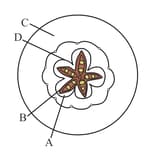Embibe Experts Solutions for Chapter: Sexual Reproduction in Flowering Plants, Exercise 1: NEET - 7th May 2017
Embibe Experts Biology Solutions for Exercise - Embibe Experts Solutions for Chapter: Sexual Reproduction in Flowering Plants, Exercise 1: NEET - 7th May 2017
Attempt the free practice questions on Chapter 24: Sexual Reproduction in Flowering Plants, Exercise 1: NEET - 7th May 2017 with hints and solutions to strengthen your understanding. EMBIBE CHAPTER WISE PREVIOUS YEAR PAPERS FOR BIOLOGY solutions are prepared by Experienced Embibe Experts.
Questions from Embibe Experts Solutions for Chapter: Sexual Reproduction in Flowering Plants, Exercise 1: NEET - 7th May 2017 with Hints & Solutions
Given below are two statements :
Statement I: Cleistogamous flowers are invariably autogamous
Statement II: Cleistogamy is disadvantageous as there is no chance for cross pollination
In the light of the above statements, choose the correct answer from the options given below :
Identify the incorrect statement related to pollination:
Which part of the fruit, labelled in the given figure makes it a false fruit?

The term used for transfer of pollen grains from anthers of one plant to stigma of a different plant which, during pollination, brings genetically different types of pollen grains to stigma, is
A typical angiosperm embryo sac at maturity is:
In some members of which of the following pairs of families, pollen grains retain their viability for months after release?
Which of the following is incorrect for wind-pollinated plants?
In water hyacinth and water lily, pollination takes place by:
